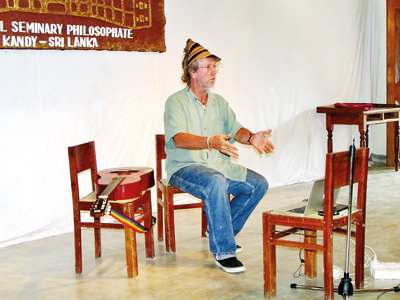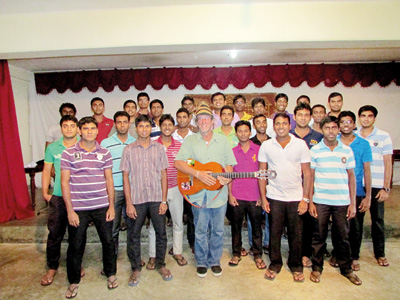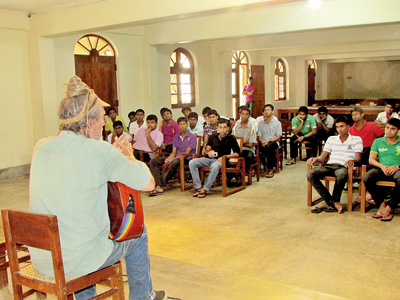Reaching out through Reggae music
View(s):The last few months have seen Prhlad Prana Cave frequenting the Bandaranaike International Airport. It was redently that he flew back home after a month long stay in the island, having made another trip earlier in June last year. Prhlad is the chairman of the Survival Reggae Clubs of Sri Lanka and Australia. When he arrived early in June last year, he brought with him a reggae band. His visit this time around however was ‘educational’.Just him and his love for everything Rasta, he travelled around the country organizing workshops and teaching others about the music and culture that cast a spell over him and so many others since its very inception.
 “Reggae is music with a message” he explains, quoting Bob Marley, one of his personal idols. Having been involved with the Rasta culture while growing up in England, Phralad’s passion for Reggae music and culture followed him to university where he based his final paper for his Honours Degree on Rastafarianism.
“Reggae is music with a message” he explains, quoting Bob Marley, one of his personal idols. Having been involved with the Rasta culture while growing up in England, Phralad’s passion for Reggae music and culture followed him to university where he based his final paper for his Honours Degree on Rastafarianism.
The idea for a Survival Reggae Club was ignited by the King of Reggae; Marley himself. Following his world tour in 1981, with a visit to Australia, two fellow Aussies sought out his advice for keeping reggae alive back home. With its roots in Melbourne, today, the Survival Reggae Club is a global movement with branches all over the world. Together with Sunil Pathirana, the two founded the Sri Lankan branch back in 2009.
On what could only be counted as his nth visit to an island he has been coming to since 1983, Prhlad found himself detouring from the obvious Reggae strongholds and travelling instead a seminary in Kandy. Teaching the forty strong group of 19 and 20 year olds about the practical elements of Reggae music , it was followed by explaining to them the history and roots of a genre of music whose power and influence would go on to spark a movement and way of life.
“I tried to establish the difference between the fashion of the Rasta culture we see today and what it really means” he said. What has emerged into a fad of beanies, cannabis and alcohol isn’t the Rasta culture that followers like Prhlad remember. “Authentic Rasta culture was about respect and dignity” he articulates, drawing its history to black slavery. Centred on the themes of religion, politics and most importantly freedom he finds it to be the roots for the newer genres of like hip hop and rap.
His expedition to Kandy left him with a lot of positive reaction from the kids, “It seemed to have made a strong impression on them” he reflects. Making time to talk about the pop culture and social identity of Rasta was important to him. “I see young, educated people trying to get back part of their culture” he describes, especially with youngsters who prefer to embrace anything Western while erasing their cultural fingerprints. “it’s my greatest wish to see them hold on to their culture.”




